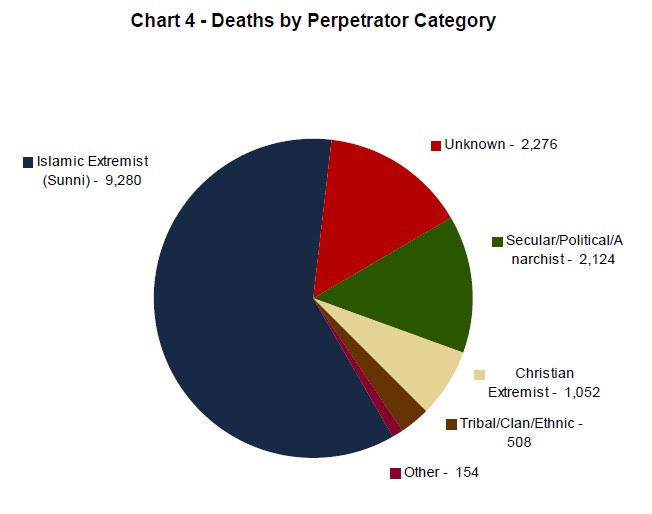Naif Al-Mutawa wrote an essay for the Philadelphia Inquirer last year which is typical of such politically correct thinking. The central point, in his essay, “The Many Shapes of Extremism”, was this:
“My intent was to advance the notion that extremism is nothing more than a bunch of neurotransmitters working overtime – or perhaps under time. It is not Islam or Judaism or Hinduism that creates extremism; rather, some people are predisposed to extremism and will pursue it in any faith.”(Here’s a link to Al-Mutawa’s essay published elsewhere)
Al-Mutawa may be correct to some extent. I’m sure certain individuals are indeed naturally (even, perhaps, biologically) more predisposed to extremism than others, just like some people are more predisposed to abusing drugs or alcohol. But, as with alcohol abuse, we wouldn’t deny an element of choice involved in the behavior would we? Further, if certain cultures have a higher degree of alcoholism than other cultures it would be reasonable to ask why…what are the cultural and ethical norms that may contribute to this disparity. Naif Al-Mutawa refuses to acknowledge or address the fact that (while, again, the overwhelming majority of Muslims are not extremists), violent extremist acts are, when motivated by religion, dramatically more likely to be carried out by Muslims than by non-Muslims (Christians, Jews, Buddhists, Hindus, etc.)
The point isn’t to prejudge or, in any way, demonize Muslims. Rather, the point is that, as extremism in our day is to a large degree a radical Islamic phenomena, it is incumbant for the Muslim community to acknowledge this problem, figure out the religious/cultural factors influencing such aberrant behavior, and stop insisting (contrary to all the evidence) that other religions are also plagued with the same degree of extremism. Ultimately, the moderate forces in their community must do ideological battle with the extremists in their midst – to win hearts and minds for a future Islam not compromised such extremism.
Here is my reply to Al-Mutawa, published by The Inquirer in their letter to the editor section:
“Naif Al-Mutawa’s op-ed (“The many shapes of extremism,” April 8) advances the erroneous notion that extremism is equally distributed among the three major faiths.While it is important to stress that the overwhelming majority of Muslims are not terrorists, the overwhelming majority of terrorist acts – according to data published online by the National Counter-Terrorism Center – committed by those inspired by religion are indeed (Sunni) Muslim. While I understand that many well-meaning Americans would cringe at the suggestion that terrorists are far more likely to be Muslim than Jew, or Christian, the problem with extremism in our time is the radical, violent manifestations of specific faith traditions. Empirical data should never take a back seat to feel-good assumptions and platitudes. At stake isn’t merely the intrinsic value of truth and accuracy but, more specifically, the broader truism that we can’t rally the civilized world to win a war – militarily or morally – against an enemy that we’re not allowed to name.
As Herbert London of the Hudson Institute aptly pointed out in a recent post:
“People who know nothing about Islam agree that most Muslims do not commit violent or terrorist acts, therefore the religion is peaceful; but that is a classic non sequitur. Most Germans in the 1930′s did not embrace the excesses of Nazism. Most Chinese did not subscribe to the slaughter of millions during Mao’s Long March. Most Russians did not support Stalin’s purges.
“It usually takes a minority to start a revolution or “killing fields.” The key feature of radicalization in any religion or political movement is the silence, or presumptive acquiesce, of the majority, who is mainly moderate.
“The fact is that fanatics influence history more than moderates…
“The group that counts, the group that launches historical trends, is the extremist one that threatens everything we hold dear. To deny this is to deny a reality that allows fanatics to control our very existence.”
“It is, naturally, difficult to come to grips with this condition. The comforting notion that most Muslims are “just like us” will not fly when one considers who are those moving historical forces. What this adds up to may be difficult to contemplate, but it is better to confront that reality now than at a time when it is too late to resist.”
via cifwatch.com
There is no Moderate Islam if it can not counter so called Radical Islam.
